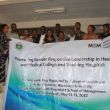Promoting Gender Responsive Leadership in Health at the Medical College and Teaching Hospital
A three-day training workshop (11 to 13 May 2022) on gender responsive leadership was organized at Haramaya University, College of Health and Medical Sciences (CHMS) in Ethiopia, supported by the Elisabeth Strouven Foundation and Maastricht School of Management (MSM).
Fifteen leaders, out of whom 8 were women, joined the workshop in Harar town, Ethiopia. Among these leaders were the Chief Academic and Research Director, team leaders of nurses, doctors, head of students’ clinic, security personnel, student deans, and the head of the library.
The main objective of the workshop was to create an understanding of gender related issues in the health and medical sector and motivate leaders to play their part in making gender equality and the empowerment of women a reality in the health and medical college and teaching hospital.
The first day of the workshop was devoted to creating an understanding of the concept of gender, gender equality and equity, and women empowerment in the health and medical sector. Emphasis was given to factors constraining gender equity and women empowerment in the sector, and the role of leaders to ensure gender equality and women empowerment in the health and medical college and teaching hospital.
Some of the constraining factors raised during the small group discussion were lack of understanding on the need and importance of gender equity and women empowerment in the health and medical sciences, systemic discrimination due to gender bias being embedded in the clinical practice and teaching, and the medical sector often being considered as gender-neutral. Also, the audience brought forward the assumption that the impact of health-related issues affects society equally, and fails to consider the position of women and young girls, and the denial that gender inequality exists in the medical college and teaching hospital.
After the discussion, most of the leaders mentioned that they realized that gender equity and women empowerment is not about favoring women but about improving performance and service delivery in their institution, development of their society and their country, for which they need to play their part using their positions. For example, one of the male participants said, “I never considered gender issues as men’s issues, and I now realize that empowering women is central to societal health and addressing poverty.”
Day two of the workshop was devoted to sexual harassment in teaching hospitals and medical colleges and the role of leaders in addressing these issues. Accordingly, the concept of sexual harassment, contributing factors, and ways to address the issues were discussed. The participants mentioned that they realized most of the acts of gender based sexual harassment have been normalized in their working environment. They have learned to be conscious of their behavior and observe their environment to avoid unwelcome conduct that affects students and staff to do their job. The leaders also showed enthusiasm to play their role in creating a working environment where harassment is not tolerated.
The focus of day three was on the concept of gender-responsive leadership and how leaders can be gender-responsive. During the reflection on the learning points, most participants mentioned that they realized being a leader gives them a better opportunity to play a key role in ensuring gender equality and empowering women through their decisions and actions.
Finally, it was suggested for the training to be continued, targeting all leaders of CHMS. In addition, the participants, the associate dean for special needs, gender, and HIV and AIDS including the Chief academic and research director promised to play their part in the sustainability of gender equality and women empowerment activities in the CHMS and Hiwot Fana Specialized Hospital.
MSM's Expert Centre for Emerging Economies
This project is part of MSM's Expert Centre for Emerging Economies. The department is an expert centre on local economic development in emerging and developing markets. We capacitate managers and professionals from government, private sector, NGOs, and post-secondary education in Africa, Asia, Middle East, and Latin America. We offer consultancy and customized training programs, and we manage complex projects in key sectors, e.g. water, agriculture and health. For more information click here.
Related news
MSM and Elisabeth Strouven fund expand collaboration
Gender awareness creation and ways forward in the health and medical sector in Ethiopia
Capacity Enhancement to achieve Gender Equality and Women Empowerment in the Medical Sector in developing countries
Female Talent Development in Ethiopia

